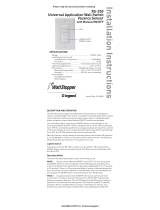Page is loading ...

CW-100
120VAC, 60Hz
Residential Vacancy Sensor
California Title 24 2005 Compliant
SPECIFICATIONS
CW-100
Voltage . . . . . . . . . . . . . . . . . . . . . . . . . . . . . . . . . . .120VAC, 60Hz
Load Requirements
@120VAC . . . . . . . . . . . . .0-500W Incandescent, MLV, ELV
. . . . . . . . . . . . . . .Fluorescent and Compact Fluorescent
Horsepower Rating . . . . . . . . . . . . . . . . . . . . . . . . .1/6 HP
Time Delay Adjustment . . . . . . . . . . . . . .Fixed 1 to 30 minutes
Power Consumption . . . . . . . . . . . . . . . . . . . . .0.92W maximum
Operating Temperature Range . . . . . . . . . . .32-131°F (0-55°C)
Operating Humidity Range . . . . . . . . .95% RH, non-condensing
Installation Instructions

INSTALLATION
Caution: A neutral connection is required for sensor operation.
A qualified electrician should be consulted regarding the availability of a
neutral in your particular installation.
1. Make sure that power has been
turned off at the circuit breaker.
2. Connect the existing wires to the
sensor terminals.
•
Hot or Black to Line;
Load or Red to Load;
Ground or Green to Ground;
Neutral or White to Neutral.
• Do not allow any bare wire to
show above the connector.
3. Attach the sensor to the wall box
by inserting screws into the two
wide holes on the top and bottom
of the attached metal bracket.
Line them up with the holes in the wall box and tighten.
4. Turn on the circuit breaker. Push the on/off button and the lights will turn
on.
TOP
INDOOR USE ONL
Y
TOP
INDOOR USE ONL
Y
Insert or wrap wire as shown.
Tighten screw in the clockwise direction.
CAUTION: TURN THE POWER OFF
AT THE CIRCUIT BREAKER BEFORE WIRING.
Call 800.879.8585 or 972.578.1699 for Technical Support
Wire insert
Optional
wire wrap
Strip Gauge
#12 – #14 AWG
Cu Wire Only
UNIT DESCRIPTION
The CW-100 is a motion sensing wall switch that turns off lighting based on
vacancy. The sensor uses passive infrared (PIR) technology to sense human
motion in a controlled space. If it does not sense human motion, it
determines that the area is vacant and automatically turns the lights off.
In order to keep the lights on when someone is in the room, the sensor must
have a clear view of occupants. Obstructions such as furniture blocking the
sensor’s lens may prevent occupancy detection.
Note: Windows, glass shower doors, etc. will obstruct the CW-100’s view and
may prevent detection.
Through the CW-100’s mode selection, the user can specify the time delay
that lights will be left on after the last motion is detected (see Sensor
Adjustment & Programming section).
OPERATION
Manual-ON
Users must turn lights on by pushing the ON/OFF button. Lights will not turn
on automatically with occupancy. However, for a grace period of 30 seconds
after shut-off, the CW-100 will automatically turn the load back on when
motion is detected.
Time Delay
The CW-100 automatically turns lights off after a space becomes vacant and a
preset time interval, or time delay, elapses. If lights are left on and no motion
is detected for the time delay selected (factory default = 15 minutes), the
CW-100 automatically turns lights off.
The ON/OFF button can be used to turn lights off before the time delay expires.

SENSOR ADJUSTMENT & PROGRAMMING
Custom setup features are intended for installing personnel. Therefore, the
Program Mode switch is located behind the cover plate.
To enable the Programming mode, the single DIP switch must be in the ON
(Program) position.
Programming the CW-100:
1. Slide the Program Mode switch (normally
covered by the light switch cover plate) to
the ON (Program) position. Make note of
how many times the LED flashes. The
number of flashes indicates the current
time delay selection. (See Program Mode
Selections below.)
2. Press the ON/OFF button to advance
through the delay selections. When the
desired selection is reached, slide the
Program Mode switch back to the DOWN
(End User) position.
3. The CW-100 will operate in Test Mode for
five (5) minutes. During this period, the
time delay will be 15 seconds. After five (5)
minutes, the CW-100 will use the selected
time delay.
Note: Do not leave the Program Mode Switch
in the UP (Program) position. The
CW-100 will only operate properly in
the DOWN (End User) position.
If the light is on and the sensor
remains in Program Mode for more
than 15 minutes the light
automatically turns OFF.
TOP
ON
1
INDOOR USE ONLY
TOP
ON
1
INDOOR USE ONLY
Program
Mode
Switch
ON/OFF
Button
CW-100
LED
flashes
behind
lens
Program Mode Selections:
Flashes Time Delay
R 1 minute
RR 5 minutes
RRR 10 minutes
RRRR 15 minutes *
RRRRR 20 minutes
RRRRRR 30 minutes
* Factory default
Hot
Black
Neutral
White
Load
Load
Red
Neutral
White
TOP
INDOOR USE ONLY
ON
1
Ground
Green
Single-sensor wiring
WIRING
Visit our website for FAQs: www.wattstopper.com
COVERAGE PATTERNS
The CW-100 has a coverage range of 180 degrees and a
maximum coverage area of 300 sq. ft. To maintain its coverage
capacity and optimally detect motion, the CW-100 must have a
clear and unobstructed view.
4.0'
(1.2m)
25'
(7.6m)
floor
25'
(7.6m)
10'
(3.1m)

TROUBLESHOOTING
To test the CW-100:
Initiate the CW-100 Test Mode by sliding the Program Mode Switch up to the
ON (Program) position then back to the DOWN (End User) position.
When the switch is returned to the DOWN (End User) position, there will be a
five-minute test period. During this period, the time delay will be 15 seconds.
Move within the coverage zone of the CW-100 to trigger detection, then move
out of the coverage zone (see Coverage Patterns section). The load should
turn off within 15 seconds. Repeat as necessary to ensure that the desired
coverage areas are within detection range.
Lights will not turn on:
1. Press ON/OFF button, lights should turn on.
2. Make certain that the circuit breaker is on and functioning.
3. Check sensor wire connections to the load.
4. Check wiring connections to the sensor.
5. Check the lamp.
6. Call 800.879.8585 for technical support.
Lights turn off while the space is occupied.
1. Make sure nothing is blocking the sensor’s lens.
2. If the occupants have been very still (motionless) for the duration of the
time delay, this is normal operation. To automatically turn the lights back
on, make motion in the sensor’s view within 30 seconds of the shut-off.
LED is flashing and lights turn OFF after 15 minutes:
1. Sensor is in Program Mode.
2. See SENSOR ADJUSTMENT & PROGRAMMING for the location of the
Program Mode Switch.
3. Put the switch in the DOWN (End User) mode.
When ordering, add the color suffix to the catalog number:
-WA for white
-IA for ivory
-AA for light almond
* One ASP-211 is included with each sensor.
CW-100 Residential Vacancy Sensor, California Title 24 2005
Compliant, 120VAC, 60Hz
ASP-211* Cover plate for single-gang box
ASP-422 Blank cover plate for double-gang box
ASP-432 Cover plate for double-gang box with switch option
ORDERING INFORMATION
Call 800.879.8585 or 972.578.1699 for Technical Support
WARRANTY INFORMATION
Watt Stopper/Legrand warranties its products to be free of defects in
materials and workmanship for a period of five (5) years. There are no
obligations or liabilities on the part of Watt Stopper/Legrand for
consequential damages arising out of, or in connection with, the use or
performance of this product or other indirect damages with respect to loss of
property, revenue or profit, or cost of removal, installation or reinstallation.
2800 De La Cruz Boulevard, Santa Clara, CA 95050
Technical Support: 800.879.8585 • 972.578.1699
www.wattstopper.com
04390r2 03/2005
/

